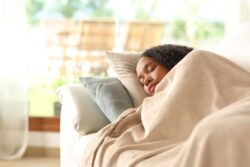I Have Sleep Apnea — Is It Okay for Me to Take Naps?
June 22, 2025
Sleep apnea can deprive you of rest and leave you feeling exhausted throughout the day. The idea of lying down to take a nap can certainly seem appealing! Plus, under normal circumstances, a brief nap can be quite beneficial. But is napping really a good idea if you have sleep apnea? This blog post explains some key points for you to keep in mind.
The Downsides of Napping with Sleep Apnea
One of the most significant concerns is that naps can disrupt your natural sleep schedule. When you sleep during the day, you may find it harder to fall asleep or stay asleep throughout the night. This disruption can further fragment your sleep cycle, which is already less than ideal due to your sleep apnea.
Another important factor is your access to sleep apnea treatment. Many people do not have their CPAP machines or oral appliances readily available when they nap, particularly if the nap occurs away from home. Without your treatment, you risk experiencing the same interrupted breathing and oxygen deprivation that occurs during nighttime sleep, which can mean that your nap may provide few if any benefits.
Additionally, taking daytime naps may lead to a pattern of compensating for poor nighttime sleep. This approach can create a cycle in which you become reliant on naps, rather than addressing the root causes of your nightly sleep disturbances. This dependence can make it increasingly difficult for you to establish a consistent and restorative sleep routine.
Tips for Napping with Sleep Apnea
If you do choose to nap with sleep apnea, there are steps you can take to protect the quality of your sleep:
- Nap in an environment where you have access to your prescribed treatment device, such as a CPAP machine or oral appliance. (Oral appliances are much more portable than CPAP machines, so they are best if you plan on napping away from home.)
- Keep your naps brief, ideally lasting only 20 to 30 minutes, so you avoid entering deeper stages of sleep that may lead to grogginess.
- Nap earlier in the afternoon, which is less likely to interfere with your natural circadian rhythm and your ability to fall asleep at night.
- Establish a regular nighttime routine so your body gets into a good rhythm; this can reduce the urge to nap during the day.
Naps can provide a valuable boost of energy, but they should not become a habit, especially if you have sleep apnea. Focus on improving the quality of your nighttime sleep so you can enjoy the highest-quality rest possible.
Meet the Practice
At Florida Dental Sleep Disorders, Drs. Yitta Garden and Kenneth Mogell, a double board-certified sleep dentist, work together to provide oral appliance therapy to members of the communities we serve. If you have questions about how you can optimize the quality of your nightly shuteye, we would be happy to consult with you. Contact our Melbourne office at 321-265-3462.
